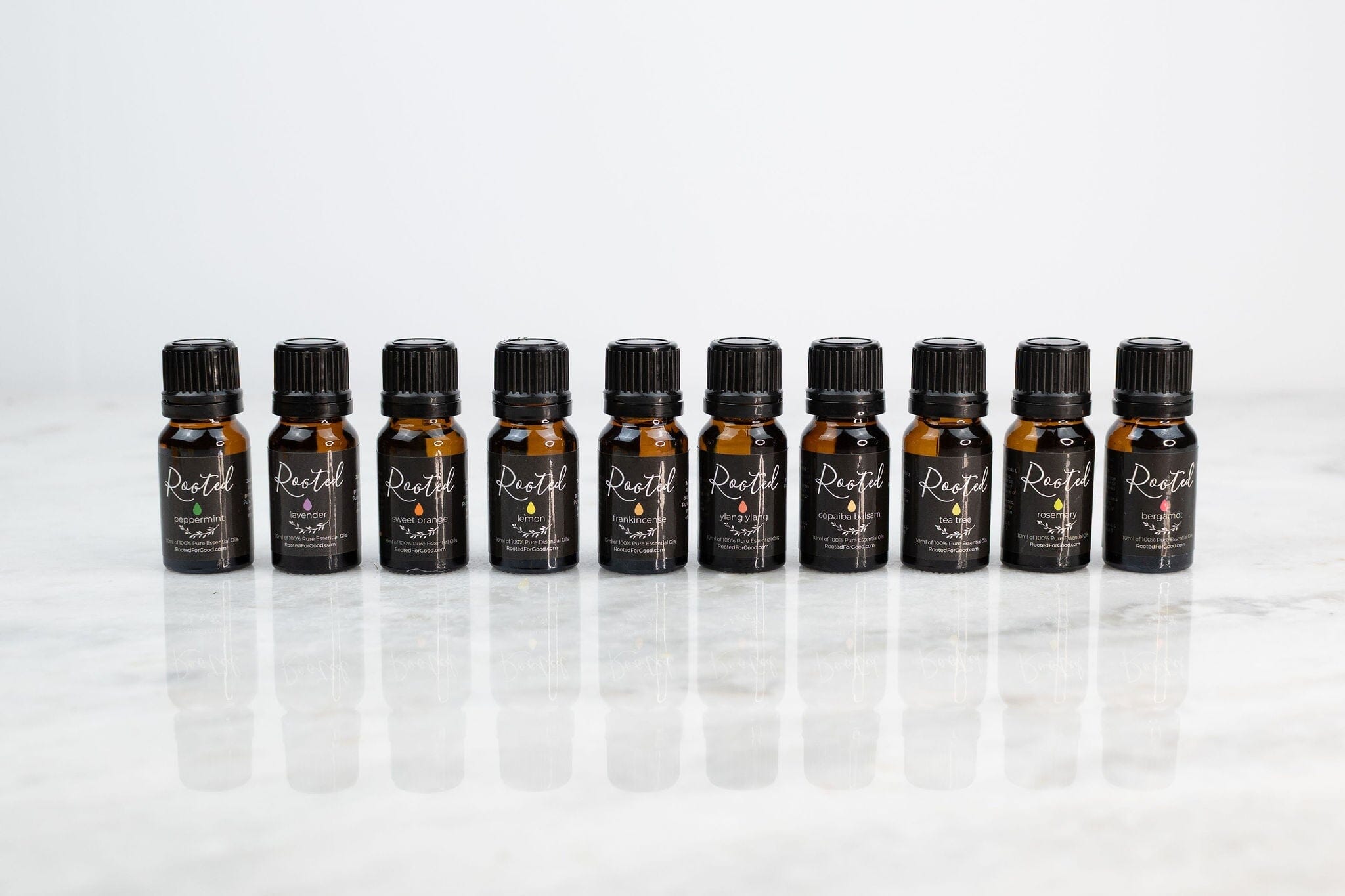Key Takeaways
- Many over-the-counter bloating remedies contain hard-to-pronounce ingredients that may concern users.
- The author has personal experience with bloating and seeks effective, understandable solutions.
- Essential oils are presented as a natural alternative for bloating relief.
- The guide aims to help readers find safe and effective options for bloating discomfort.
Table of Contents
- Ever Wondered What's Really in Your Bloated Belly Relief?
- Our Philosophy: Goodness. Truth. Real Beauty.
- Understanding Bloating: What's Happening in Your Body
- Essential Oils & Digestive Health: How They Actually Work
- Best Essential Oils for Bloating: Honest Ingredient Breakdown
- How to Use Essential Oils for Bloating Relief
- Choosing Application Methods: Topical vs. Aromatic
- Essential Oils vs. Conventional Bloating Remedies
- When Essential Oils Don't Provide Expected Relief
- Safety and Transparency: What Every Family Should Know
- Who Benefits Most: Real Life Applications
Ever Wondered What's Really in Your Bloated Belly Relief?
Picture this: you're doubled over after dinner, reaching for whatever remedy promises fast relief, but can you actually pronounce the ingredients on that label? As a licensed cosmetologist and mom of six boys, I've been there. That uncomfortable bloating hits, and you want something that works without questioning what you're putting on or near your body. Digest Aid Essential Oil Blend is a natural option that many families trust for gentle relief.
This frustration led me down a path of creating transparent, effective solutions for our family of eight. When my husband asked about my bucket list, "Use only natural products for our family for three months" seemed simple enough. That challenge became Rooted For Good, because families deserve to know exactly what's helping their digestive comfort. If you're just starting out, a Blend Essential Oils Starter Kit can be a great way to explore natural options for digestive support.
Our Philosophy: Goodness. Truth. Real Beauty.
When I started formulating for digestive comfort, my mission was simple: create products that work without hiding behind vague labels or harsh chemicals. Every essential oil for bloating in our collection is handcrafted with 100% natural ingredients and therapeutic-grade essential oils, no toxins, no fillers, no mystery ingredients you can't pronounce.
Our family-run, mission-driven approach means we're rooted in faith and committed to transparency. Real beauty already exists; our role is supporting your body's natural processes, never masking them. Whether you're dealing with post-meal discomfort or occasional digestive stress, you deserve honest labels and ingredients that make sense for real life.
What's In (And What's Not):
- Included: Therapeutic-grade essential oils, plant-based carrier oils, simple recognizable ingredients
- Excluded: Synthetic fragrances, artificial preservatives, petroleum-based ingredients, hidden fillers
- Promise: Full transparency, every ingredient listed, every benefit explained
Understanding Bloating: What's Happening in Your Body
Bloating stems from several triggers: imbalanced gut bacteria, stress responses, food sensitivities, or simply eating too quickly while chasing kids around the kitchen. Your digestive muscles contract irregularly, trapping gas and causing that uncomfortable swollen feeling we all recognize.
For families with sensitive skin, like many of us dealing with everything from baby eczema to adult sensitivities, harsh remedies aren't an option. Traditional antacids often contain artificial dyes, aluminum compounds, or synthetic additives that can irritate already sensitive systems. This is where gentle, properly diluted peppermint oil for bloating becomes invaluable.
The Real-Life Connection
When you're pregnant, nursing, or managing children's delicate skin, you need solutions that won't cause additional reactions. Essential oils, when used correctly, offer the digestive support you need while respecting your body's sensitivity levels. For more ways to use essential oils for your family's wellness, see these 3 essential oils for overall health and wellness.
Essential Oils & Digestive Health: How They Actually Work
Essential oils aren't magic, they're concentrated plant compounds that interact with your body's natural systems. When you apply a properly diluted essential oil for bloating to your abdomen, these compounds penetrate the skin and work locally to relax smooth muscle tissue in your digestive tract.
The science centers on three key mechanisms: antispasmodic action (stopping muscle spasms), carminative effects (helping release trapped gas), and anti-inflammatory properties (reducing tissue irritation). Peppermint oil, for example, contains menthol that directly relaxes the muscles in your intestinal wall.
What Research Shows
Studies consistently demonstrate peppermint oil's effectiveness for digestive discomfort, with clinical trials showing significant symptom reduction compared to placebo. Fennel oil research indicates its ability to stimulate digestive enzymes, while ginger oil studies confirm its anti-nausea and anti-inflammatory benefits. For a deeper dive into the science, see this peer-reviewed study on essential oils and digestive health.
The key difference between therapeutic-grade oils and commercial products lies in purity and concentration. When you choose properly sourced essential oil for bloating, you're getting the full spectrum of beneficial compounds without synthetic additives that might counteract the natural benefits.
Best Essential Oils for Bloating: Honest Ingredient Breakdown
After years of formulating for our family of eight, I've identified the most effective essential oil for bloating relief. Each oil brings specific benefits, and knowing what each does helps you choose what works for your body's needs. If you're interested in exploring a variety of single oils, the Single Essential Oils Starter Kit is a great place to begin.
Peppermint Oil - The Digestive Powerhouse
Best for: Muscle spasms, trapped gas, and post-meal discomfort
Peppermint oil contains 30-50% menthol, which directly relaxes smooth muscle tissue in your digestive tract. This makes it exceptionally effective for cramping and spasms. However, it can worsen acid reflux in some people, so start with lower dilutions if you have GERD.
Fennel Oil - The Gentle Encourager
Best for: Sluggish digestion, mild bloating, and sensitive stomachs
Fennel oil stimulates digestive enzyme production while being gentle enough for children and sensitive skin. Its sweet, licorice-like aroma makes it pleasant for whole-family use, and it works particularly well for bloating related to slow digestion.
Ginger Oil - The Anti-Inflammatory Champion
Best for: Nausea, inflammation-related bloating, and travel discomfort
Rich in gingerol compounds, ginger oil addresses both nausea and inflammatory responses in the digestive tract. It's particularly valuable when bloating accompanies motion sickness or stress-related digestive upset. For more on using essential oils for nausea, read our essential oil for nausea guide.
What's Intentionally Left Out:
- No synthetic menthol: Only natural peppermint oil compounds
- No petroleum-based carriers: Plant-based carrier oils only
- No artificial fragrances: Pure therapeutic-grade essential oils
- No undisclosed ingredients: Every component clearly listed
How to Use Essential Oils for Bloating Relief
The most effective application combines proper dilution with targeted massage techniques. For abdominal massage, blend 2-3 drops of your chosen essential oil for bloating with 1 teaspoon of plant-based carrier oil like jojoba or fractionated coconut oil.
Abdominal Massage for Digestive Comfort
Apply your diluted blend to clean hands and massage in clockwise circles around your navel, following your colon's natural path. Spend 2-3 minutes with gentle, consistent pressure. This technique works best after meals or before bedtime when you can relax fully.
Aromatherapy Application
Add 3-4 drops of peppermint or fennel oil to a diffuser for 15-20 minute sessions. The aromatic compounds work through your olfactory system to trigger digestive responses. This method works particularly well for stress-related bloating or when topical application isn't convenient. If you don't have a diffuser yet, consider the Blend Essential Oils Kit + Diffuser for a complete starter set.
DIY Roll-On Blend for Busy Families
Combine 10 drops peppermint oil, 8 drops fennel oil, and 5 drops ginger oil in a 10ml roller bottle. Fill with fractionated coconut oil, leaving small headspace. This creates a grab-and-go solution that's properly diluted and ready when discomfort strikes.
Choosing Application Methods: Topical vs. Aromatic
Your choice between topical and aromatic application depends on your specific symptoms, skin sensitivity, and lifestyle needs. Both methods deliver therapeutic benefits, but through different pathways and timeframes.
Topical Use: Direct and Targeted
Topical application provides localized relief directly where you need it most. The essential oil for bloating absorbs through your skin and works on underlying muscle tissue within 10-15 minutes. This method offers the most concentrated benefits but requires proper dilution to prevent skin irritation.
Aromatic Use: Gentle and Systemic
Aromatherapy works through your nervous system to trigger digestive responses and reduce stress-related bloating. Effects typically begin within 5-10 minutes and provide more subtle, whole-body support. This method works well for children, pregnant women, or those with very sensitive skin. For more gentle wellness ideas, see our article on essential oil for sleep.
| Method | Speed of Relief | Intensity | Best For | Safety Considerations |
|---|---|---|---|---|
| Topical | 10-15 minutes | Concentrated | Acute symptoms, localized pain | Requires proper dilution |
| Aromatic | 5-10 minutes | Gentle | Stress-related bloating, sensitive individuals | Generally safe for all ages |
Essential Oils vs. Conventional Bloating Remedies
When choosing relief for digestive discomfort, understanding how different approaches compare helps you make informed decisions for your family. I've evaluated essential oil for bloating against conventional options based on ingredient transparency, gentleness, and real-world effectiveness.
| Factor | Essential Oils | OTC Antacids | Prescription Medications |
|---|---|---|---|
| Ingredient Transparency | Complete disclosure of plant sources | Often contains artificial colors, fillers | Variable disclosure requirements |
| Side Effect Profile | Minimal when properly diluted | Potential mineral imbalances, rebound acid | Range from mild to significant |
| Family Suitability | Safe for all ages with proper dilution | Age restrictions for children | Medical supervision required |
| Mechanism of Action | Supports natural digestive function | Neutralizes stomach acid | Blocks or alters specific pathways |
Peppermint vs. Fennel vs. Ginger: Targeted Relief
Each essential oil for bloating addresses different underlying causes. Peppermint works best for muscle spasms and trapped gas, providing relief within 10-15 minutes of topical application. Fennel excels at encouraging sluggish digestion and works gently enough for sensitive stomachs. Ginger targets inflammation-related bloating and nausea simultaneously, making it ideal for stress-induced digestive upset. For more on peppermint oil's clinical use, see this Harvard Health article on peppermint oil.
For families seeking clean, transparent solutions, therapeutic-grade essential oils offer predictable results without hidden ingredients or synthetic compounds that can complicate sensitive systems.
When Essential Oils Don't Provide Expected Relief
Sometimes your first attempt with essential oil for bloating doesn't deliver the comfort you're seeking. This usually stems from application method, dilution ratios, or timing rather than the oils themselves being ineffective.
Addressing Application Challenges
If topical application causes skin sensitivity, reduce your essential oil concentration to 1 drop per teaspoon of carrier oil instead of 2-3 drops. For aromatherapy that seems weak, ensure your diffuser covers the appropriate room size and run it for shorter, more frequent sessions rather than continuous operation.
Supporting Factors Beyond Essential Oils
Essential oils work most effectively when combined with gentle dietary awareness. Drinking warm water before applying your blend helps prepare your digestive system. Stress management through deep breathing while massaging your abdomen amplifies the oils' relaxing effects on smooth muscle tissue.
Recognizing When Professional Support Is Needed
Persistent bloating lasting more than a few days, severe pain, or symptoms that worsen despite consistent essential oil use warrant professional evaluation. Essential oils complement healthy digestion but cannot address underlying conditions that require medical intervention.
Safety and Transparency: What Every Family Should Know
Using essential oil for bloating safely requires understanding proper dilution, recognizing individual sensitivities, and knowing which situations call for extra caution. Honest transparency about both benefits and limitations helps you make confident choices for your family's wellness. If you want to explore more single oils, browse our full essential oils collection for options tailored to your needs.
Proper Dilution Guidelines
Never apply undiluted essential oils directly to skin. For adults, use 2-3 drops per teaspoon of plant-based carrier oil. Children and elderly family members need gentler ratios: 1 drop per teaspoon of carrier oil. Always test a small skin patch before broader application, especially with peppermint oil which can be more stimulating than fennel or ginger.
Considerations for Sensitive Groups
Pregnant and nursing mothers should consult healthcare providers before using any essential oil for bloating, even topically. Peppermint oil can potentially affect milk supply in some women. Children under 6 benefit most from gentle aromatherapy rather than topical application, using milder oils like chamomile or properly diluted fennel.
Honest Safety Checklist:
- Always dilute: Use plant-based carrier oils, never water
- Start small: Test patch and observe for 24 hours
- Read every label: Verify therapeutic-grade quality
- Store properly: Dark glass bottles, away from heat and children
- Know your limits: Stop use if irritation occurs
Who Benefits Most: Real Life Applications
Essential oil for bloating works best for families seeking gentle, transparent solutions that fit busy lifestyles. After formulating for our family of eight, I've seen consistent success with people who value simple ingredients and want to avoid synthetic additives in their wellness routines.
Frequently Asked Questions
How do essential oils like peppermint, ginger, and fennel help relieve bloating?
Peppermint, ginger, and fennel essential oils support digestive comfort by helping to relax digestive muscles and ease gas buildup. When used properly diluted topically or through aromatic methods, they can provide gentle relief from bloating without harsh chemicals.
What are the safest ways to use essential oils for bloating relief, topical application or aromatic methods?
The safest ways to use essential oils for bloating are either properly diluted topical application on the abdomen or inhaling them aromatically. Both methods allow the oils to support digestion gently while minimizing the risk of irritation, especially when following recommended guidelines.
How do essential oils compare to conventional over-the-counter bloating remedies in terms of ingredients and effectiveness?
Essential oils offer a natural alternative to conventional remedies, using simple, recognizable ingredients without toxins or fillers. While over-the-counter options often contain hard-to-pronounce chemicals, essential oils provide gentle, effective support for digestive comfort when used correctly, fitting well into clean, transparent routines.
What should families with sensitive skin know about using essential oils for digestive discomfort?
Families with sensitive skin should always use essential oils properly diluted with plant-based carrier oils to avoid irritation. Starting with small amounts and patch testing can help ensure comfort, making essential oils a gentle option for digestive support that fits real-life routines.





